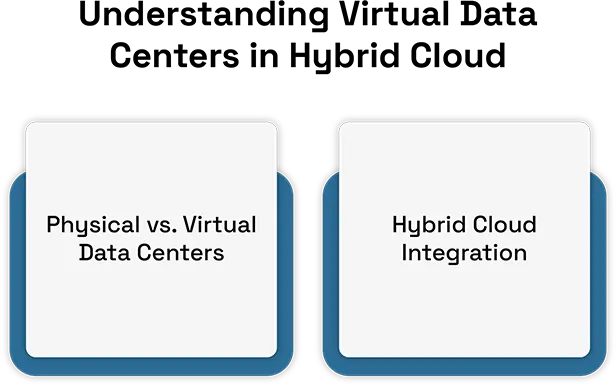Hybrid cloud environments are slowly increasing as the preferred IT model of businesses that are continually transitioning to digital platforms. One of the Key characteristics is a virtual data center in cloud computing services as it provides flexibility, scalability, and efficiency that are compulsory for today’s corporations. The referencing of the cloud-based data centers and local structures provides companies with the right blend of managing, responsive, and cost-effective services.
Understanding Virtual Data Centers in Hybrid Cloud
A virtual data center on the other hand refers to a virtual version of the conventional data center that utilizes virtualization to host and deploy IT resources. Compared to physical data centers that require constant repair and construction, VDCs are capable of smoothly running the workload in different Cloud computing centres. This creates possibilities for businesses to invest in growth of resources while keeping cost of overheads low.
As large numbers of hyperscale cloud computing data centers come into the picture, organizations can dynamically control organizational resources. Every hyperscale computing company’s solutions for such large-scale applications are reliable for hybrid models to work efficiently. This is the ability to integrate database centers with public cloud data centers for storage, data processing & easy access without compromising on the availability and security of the database.

Benefits of Virtual Data Centers in Hybrid Cloud Environments
One of the benefits of data centers that are provided by the cloud service provider is the signaled resource capability of computing and storage, which is easily increasing without any physical changes. There is no need to acquire large amounts of physical hardware; organizations can grow resources as required for business needs. This elasticity helps organizations to address varying workloads at varying times without putting so much pressure on a particular channel.
Traditional data centers require large infrastructure investment while have the cost of operations, or Capex and Opex, expenses. In cloud computing model, firms do not pay for resources they do not use depending on their ICT personnel’s consumption style. This model allows better financial planning by allowing companies to allocate funds toward the advancement of digital transformation and core business objectives rather than maintaining costly hardware.
Hybrid models also allow business to keep their important data within their location while using the public cloud for other general workloads. Some properties of cloud computing data centrals are comparable with industry laws and thus guarantee security, data privacy, and governance. This dual method improves protection against cybersecurity threats while using the scalability of cloud solutions.
A data center cloud network makes sure that the different layers of redundancy and failover solutions are in place so that businesses are not impacted by unexpected downtime. This is desirable because it minimizes data loss when data is distributed in many cloud data centers. Business continuity solutions include interface protection, safeguarding against utilization by cyber attackers or hackers, or disabling program systems and natural disasters.
Another emerging trend in data center sustainability is the eco-friendly architecture of the data center. Among the key Trends in the established data center industry are the initiatives and actions towards green computing and decreased energy use and carbon dioxide emissions levels. Sustainable measures are incorporated in programs for both cost efficiency as well as for CSR standards and legal laws
How Virtual Data Centers Support Hybrid Cloud Strategies
To operate an effective hybrid cloud strategy, smooth integration between local infrastructure and cloud-based data centers is important. By using virtualization technologies, including virtual machines & containerized workloads, businesses improve computing environments without Interrupting current operations. This hybrid method ensures agility and cost control with changing industry trends.

AI and Automation in Virtual Data Centers
Some AI applications are Grok AI to enhance management decisions in cloud computing centres with an aim of increasing the resources and systems efficiency. Through updated machine learning models, businesses can predict system requirements automatically & allocate computing power to minimize operational inefficiencies. This intelligent automation smooths workload distribution by making sure of peak performance with minimal human intervention.
Edge Computing and Hybrid Cloud Expansion
They also help to improve the hybrid cloud data center services since edge data centers extend the computing network near the source of data generation. Thus, the use of edge computing with virtual data centers allows businesses to minimize delay, increase the efficiency of real-time data processing, and improve user experiences. This method proves to be more effective, especially for applications such as IoT, Artificial Intelligence applications, and 5G networks.
Future Outlook: The Evolution of Virtual Data Centers
The further development and trends related to virtual data centers in cloud computing are based on artificial intelligence, serverless architecture, and edges. With increased workload complexities, organizations will implement better means and ways of organizing resources for work, hence improving their operations. The three key technological advancements that will improve hybrid cloud performance include multi-cloud management, SDN, and zero-trust security architecture.
Conclusion
With virtual data centers, the hybrid cloud environment continues to transform environment by being scalable, cost optimized, secure as well as sustainable. While companies Accept data center and cloud computing advancements and new-generation solutions with artificial intelligence, edge computing, and automation will become important elements of IT environments. As a result, the implementation of cloud provider data centers and public cloud solutions will help enterprises protect themselves from future disruptions and ensure the continuous activity of their digital transformation projects with qualitatively different and highly effective IT systems.








